Text
When you are learning a new language and you keep mixing formal and informal language

183 notes
·
View notes
Photo

이력서 - résumé
가게 - shop
소비자 - consumer
일하는 방 - workroom
학과 - department
수단 - policy
불 - fire
법인 - corporation
계급 - rank
빼다 - withdraw
마우스 패드 - mouse pad
보험 - insurance
소매상 - retailer
암호 - password
승객 명부 - waybill
Find the Quizlet here
36 notes
·
View notes
Text
Vocabulary: Summer (여름) w/Pictures!
안녕! Hey everyone! I have some summer vocab with pictures for y’all today! I hope they help you learn some summer-related vocab, which is especially relevant rn :) If you want to learn some more words related to summer, check out my full-length summer vocab list here! Hope this is helpful! 화이팅!
I designed these graphics with Canva btw! And you can find these pictures on my Instagram (link at the bottom of this post!) as well!


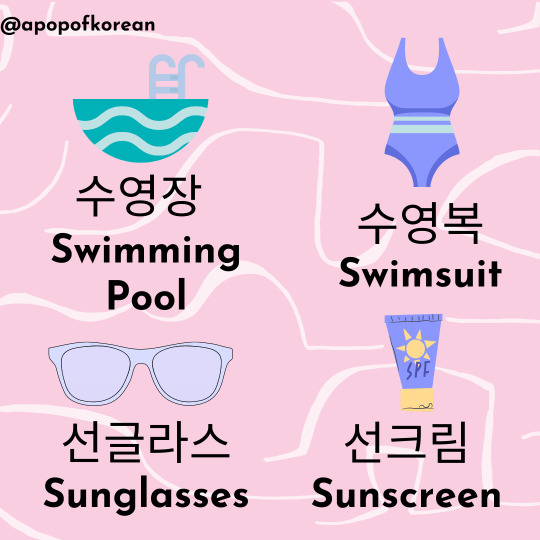
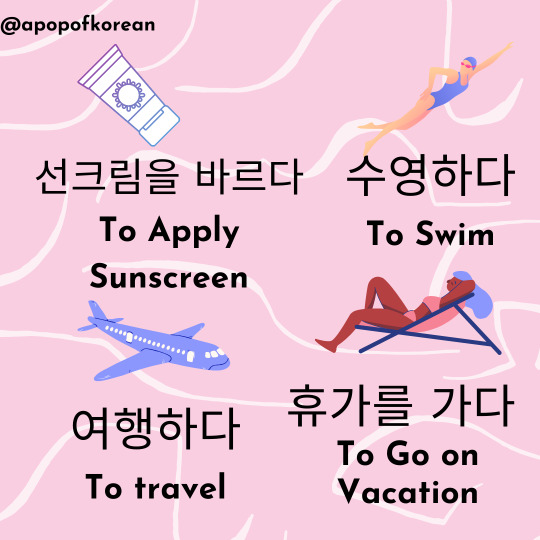

My masterlist
Join my Discord chat here and my Tumblr chat here to practice Korean with others!
Follow me on Instagram here!
Get Drops Premium using my affiliate link to expand your Korean vocab!
Check out my Ko-Fi to support this blog and my studies! Thank you for your generosity!
166 notes
·
View notes
Text
Korean: How are you?
To ask someone if they’re doing well you can use these phrases…
1) 잘 지내요?
This is a phrase you use for close acquaintances who are either of similar age to you or older. 지내요 comes from the verb 지내다. One of the few meanings of 지내다 is ‘to spend, or to pass time’. So in this phrase it’s like literally asking someone if they passed their time well or not. A more polite phrase is this…
2) 잘 지내세요?
This phrase is for when you want to be extra polite, or for meeting strangers. Here’s 2 other phrases using a different word.
3) 어떻게 지내요? 어떻게 지내세요?
The first one can be used for close acquaintances or people older than you; and the other can be used for when you want to show more politeness. 어떻게 means ‘How’. So this is like literally asking someone how have they passed their time? Well or not?
4) How to reply?
You could use either ‘네, 잘 지네요. Or 네, 잘 지네고 있어요.’ to say you’re doing well. If you’re -not- doing well then replace 잘 with 못. Which means ‘not well or bad’.
5) Long time no see!
Here’s another expression. Just conjugate 오랜만이다. It means ‘to be a long time since something’.
Example: 오랜만이에요. 네, 오랜만이에요. Long time no see! Indeed, long time no see.
27 notes
·
View notes
Text
korean vocabulary - fruits
fruit ~ 과일
apple ~ 사과
orange ~ 주황색
melon ~ 멜론
watermelon ~ 수박
peach ~ 복숭아
banana ~ 바나나
grapefruit ~ 그레이프 프루트
grapes ~ 포도
lemon ~ 레몬
lime ~ 라임
pear ~ 배
berry ~ 열매
strawberry ~ 딸기
raspberry ~ 산딸기
blueberry ~ 블루 베리
26 notes
·
View notes
Text
I think it’s important to have fun with language learning. You don’t only have to learn words that you’re going to use right away. Lists of the “100 most common words” are good, but sometimes it’s also okay to just find a random Wikipedia page and translate it. Sometimes it’s okay to go on Google Maps street view and translate whatever you find there. Learning should be fun.
82 notes
·
View notes
Note
Can you give your routine on how you practice and learn and new language. Like what more do you do?
So typically I have a vocabulary book (my preference is always thematic) and a grammar book. I will first learn from the vocab book, having a set amount to do daily. I make a course on memrise, which is my favorite flashcard app bc it is spaced repetition and looks nice. I pay for premium version of most things I use and enjoy so if I ever mention apps or anything, just assume I have the paid version. For vocab books I try to find ones that are beginner to advanced and no less than 5,000 words. The more the merrier. My current book has over 8,000 which is advanced vocab. I do this bc I like having the least amount of resources as possible.
Everyday I review the vocab until I have no misses. Once I complete my vocabulary book, I move on to grammar, once again having a set amount for the day. The reason I like doing vocab first is because I can plug it into my grammar lessons right away rather than being limited by only having a few words under my belt even though I want to make a certain sentence. With grammar books, I still prefer to have beginner to advanced all in one book but yeah.
I take notes either on my iPad (I use notability) or in a notebook. First I read the section plainly, then restart it and take notes. I always use bullet points. I don’t like mind maps or anything else besides bullet points. I always do practice questions and if there are translated sentences presented, I’ll cover the English with my hand and do it myself then check to see if I was right. If I was wrong, I try to figure out why I was wrong and correct myself. When I’m done taking notes, I read them over once and I’m done for the day.
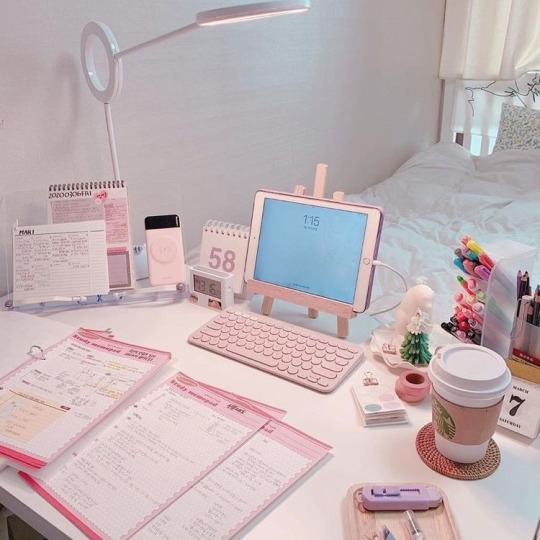
The next day before I move on to a new lesson, I just reread my previous notes as a refresher. By the time I’ve read notes every day for like a week straight I probably have memorized it properly and rereading it feels really boring, so I won’t reread those notes again for a while unless I need to remind myself of something. So like on day 2, I read day 1. On day 3, I read 1 and 2. Day 4 I read 1, 2, and 3. Eventually day 1 and 2 are fully soaked in and I can stop and just start with 3 or 4. Does that make sense? If there’s something I am having a hard time remembering correctly I’ll spend time focused on that part.
So yeah for vocab I use memrise flashcards and for grammar I just read my notes and translate things without the English part.
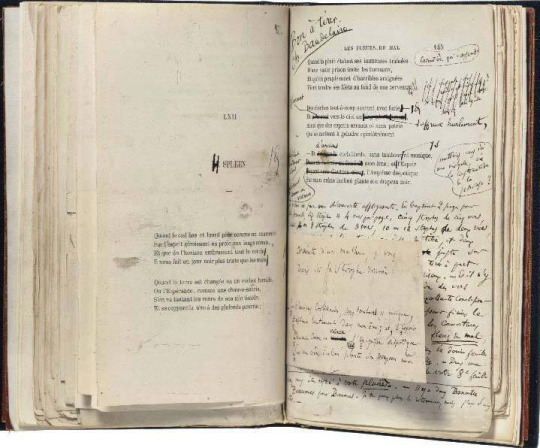
I also have regular books that are in my target language and I just read them out loud to get pronunciation practice and to see how much I understand. It’s easy to find things like Harry Potter in many languages. Reading is great bc you can get better examples of how people talk and can keep seeing sentence structures over and over again. Your brain will remember it and you’ll be able to see when you write something that isn’t “right”. Like hmm this looks weird maybe? Watching shows or movies is good too (especially if your target language has differences in speech styles vs written styles) but I’m not a huge tv girl so that’s just an occasional thing for me.
I also will get a language exchange partner and ask them to be brutal with corrections. Don’t let anything slide. This gives me real time practice and gets me more comfortable with long form conversations.
What I’m currently doing is different from normal bc I’m just following along to a website for the time being, but this is the only time I’ve ever really strayed from the aforementioned routine.

641 notes
·
View notes
Text
when you want to type something in english but forget to switch keyboard from korean so you end up typing some nonsense in korean
32 notes
·
View notes
Text
Korean Plant Notes #1
I'll be posting my Korean notes, and most likely others as well. Some of these posts will be huge and others will be small. This is a small note set that's very simple this time. Enjoy.
Vocabulary
민들레 - dandelion
꽃 - flower
뿌리 - root
허브 herb
소나무 - pine tree
만대기 - stick
나무 - tree
잎 - leaf
잔디 - grass
대나무 - bamboo
Grammar
의 : possessive particle : Acts as a " 's " in English. Apply at the end of word to show possession over object (etc).
EXAMPLE: 저의 나무 = my tree
Slang
미친년 - crazy bitch/bitch
ㅈㅅ - sorry
102 notes
·
View notes
Photo

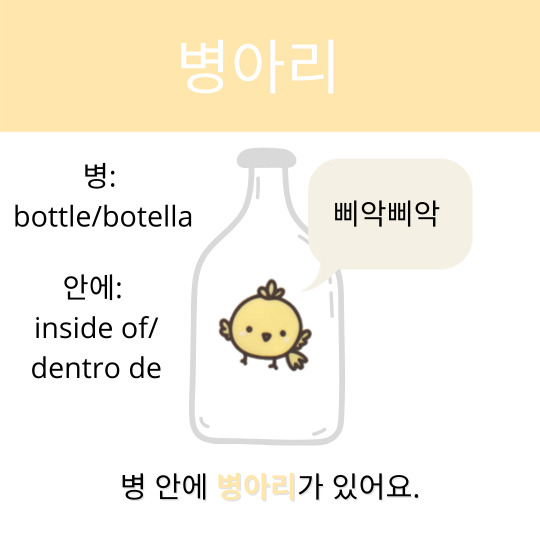
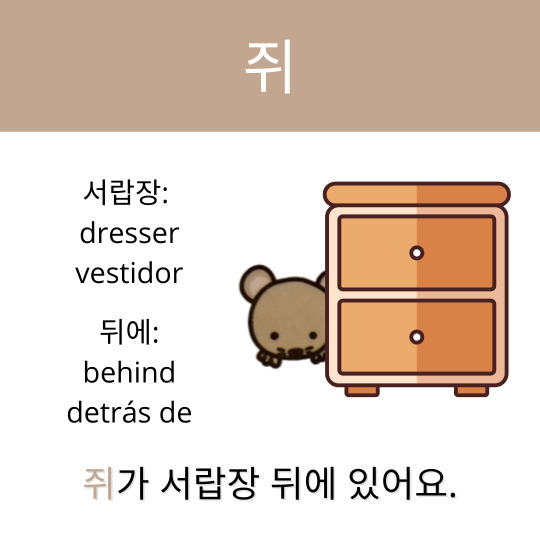

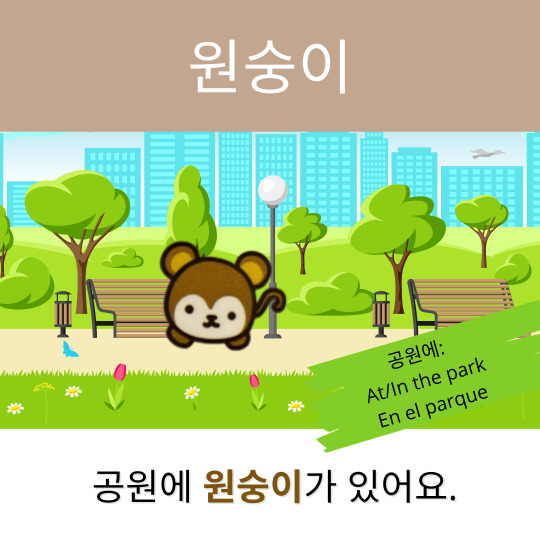
Let’s learn animal names! Do you know how to say chick, rabbit, mouse, and monkey in Korean? Translate the sentences in the pictures or make your own in the comments! Animal drawings from: OnceMoreWithLove Sticker Book
Check out my insta @Emiimmersed
11 notes
·
View notes
Photo
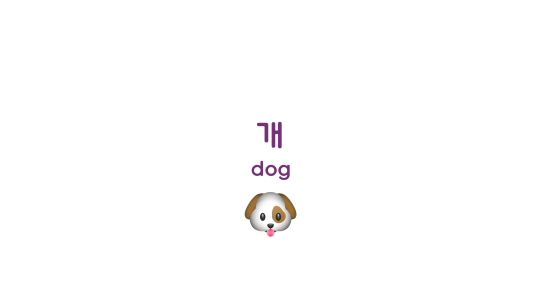
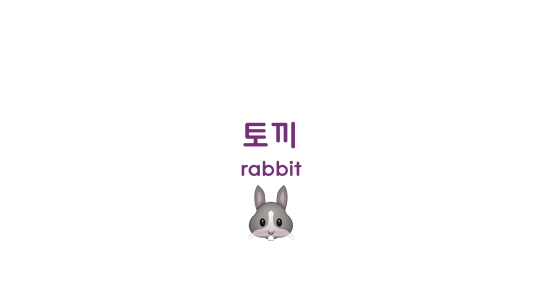

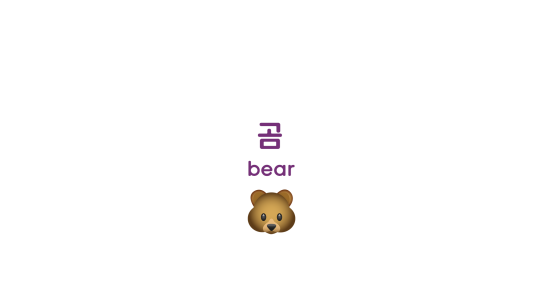

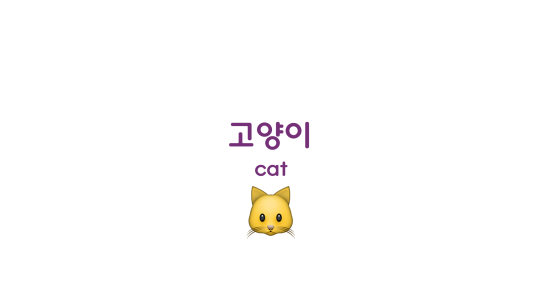
Here are 6 animal names for beginners! I love hedgehogs (고슴도치), deers (사슴) and chicks (병아리) 🦔🦌🐣
Learn Korean vocabulary on my YouTube channel!
68 notes
·
View notes
Photo


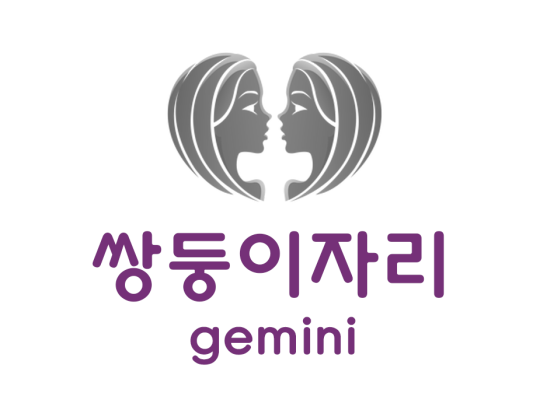
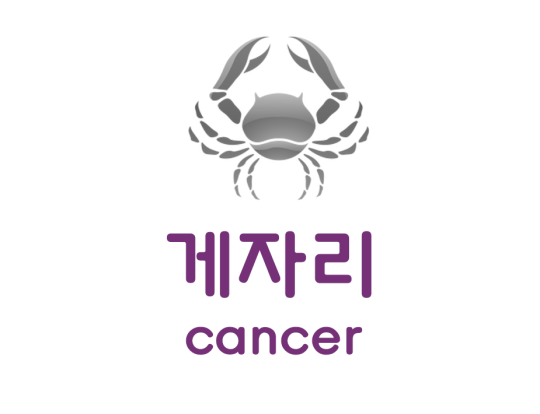


.・゜-: ✧ :- Zodiac signs in Korean -: ✧ :-゜・.Second part here!
Thank you so much for almost 100 followers, so grateful (ꈍᴗꈍ)
111 notes
·
View notes
Photo
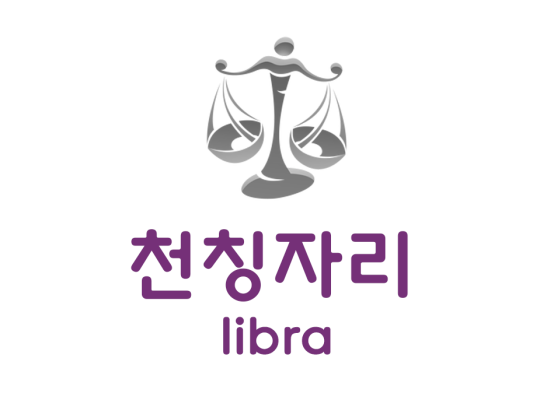

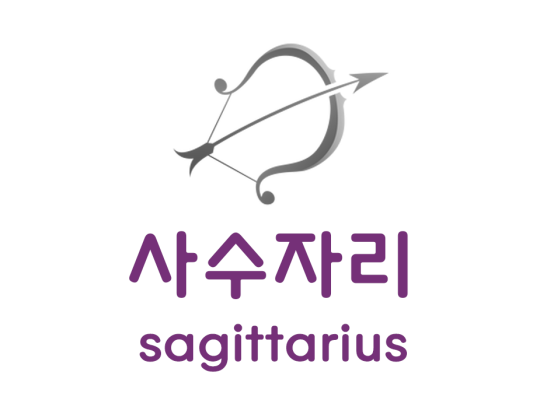


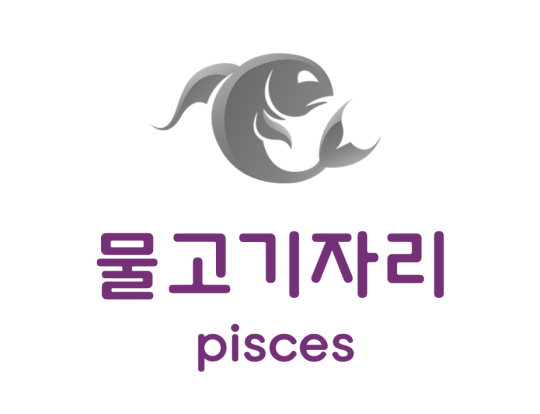
.・゜-: ✧ :- Zodiac signs in Korean -: ✧ :-゜・.First part here!
Thank you so much for almost 100 followers, so grateful (ꈍᴗꈍ)
133 notes
·
View notes
Text
Level 6 / Lesson 9: -(이)라는...
안녕하세요! Hello again everyone! This lesson is going to be related to our quoting lessons, so I recommend you go check those out before getting into this one! This lesson is going to cover how to say stuff like “a book called Harry Potter” or “a website called Tumblr” using -(이)라는! Let’s start!
Quick Recap on Quoting
Let’s look at this sentence:
저는 김지수라고 합니다. = My name is Jisoo Kim.
This literally translates to “I am called ‘Jisoo Kim’”
We know that we can use -(이)라고 to quote a noun that someone said – in this case, we’re quoting someone’s name. Let’s see another example:
그 밴드��� TXT라고 불려요. = That band is called TXT
불리다 = to be called / to be referred to as [smth]
It’s probably more natural to just say 그 밴드가 TXT라고 해요, but I just wanted to show how this structure can also be used for “being called” something, or for “calling” something by a certain name.
This brings us to talking about -(이)라는!
-(이)라는
What if you wanted to say “a band called TXT”? This is where -(이)라는 comes in! Let’s look at this formula:
[name] + (이)라는 + noun = [noun] called [name]
Attach -라는 to names ending in a vowel
Attach -이라는 to names ending in a consonant
For example:
TXT라는 밴드 = A band named TXT / A band called TXT
This is a shortened (and much more natural version) of TXT라고 한 밴드
This can be shortened even more to TXT란 밴드
Let’s see some more examples!
A Quiet Place라는 영화를 봤어요? = Have you seen the movie A Quiet Place?
저는 NCT 127의 “영웅”이란 노래를 제일 좋아해요. = I like the song called “Hero” (the English title is “Kick It”) by NCT 127 the most. / The song “Hero” by NCT 127 is my favorite.
Another Usage of -(이)란
-(이)란 can be used for things other than titles of songs and stuff. It can be used for more abstract concepts, or when you’re trying to be metaphorical or something like that. This often takes the form of [noun] + (이)란 것, meaning “the thing called [noun].” For example:
사랑이란 게 어려워요. = Love is hard.
This literally means “The thing called love is hard.”
Notice how this sentence is kind of poetic. It’s describing an abstract concept like love. Adding -(이)란 것 might not be totally required (you could probably just say 사랑이 어려워요), but it’s good to know if you want to talk about the “definition or nature” of something, as study-korean describes it.
That’s about it for this lesson! If you want to practice writing and reading Korean with others, join my Discord chat here and my Tumblr chat here! Don’t forget to follow me on Instagram too!
Want to expand your Korean vocabulary and get closer to fluency? Get Drops Premium using my affiliate link! If you would like to donate and support this blog and my studies, check out my Ko-Fi! Thank you for your generosity! See you next time! 다음에 봐요!
148 notes
·
View notes
Photo

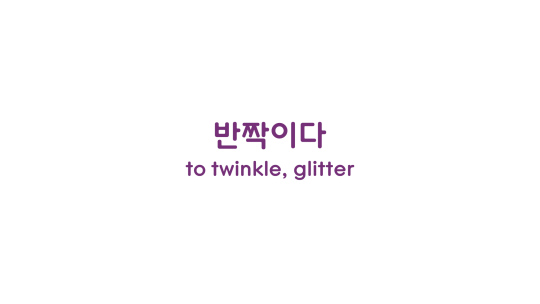




6 words from DRUNK-DAZED by ENHYPEN! Loving the 🧛♂️ vibes.
Learn vocabulary from DRUNK-DAZED here! Don’t forget to subscribe ♥
51 notes
·
View notes
Photo



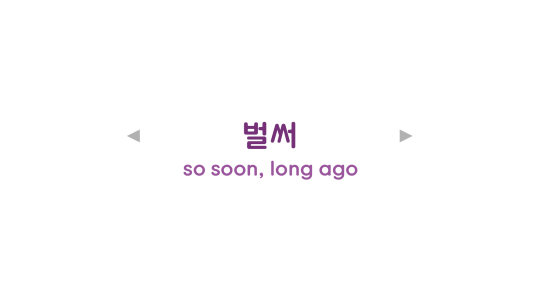
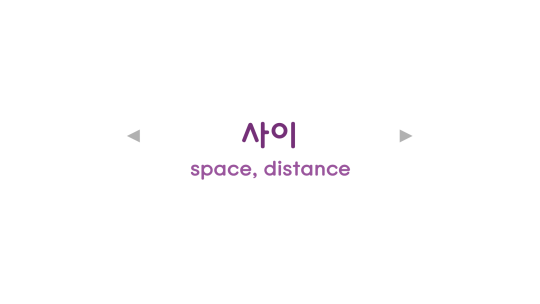

6 words from WEEEKLY’s After School! Can’t stop listening to this song 🎀🪁
learn vocabulary from After School here!
20 notes
·
View notes
